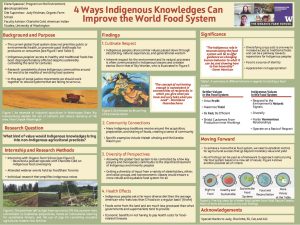4 Ways Indigenous Knowledges Can Improve the World Food System
Environmental degradation, disenfranchisement of farmers, and the over industrialization of foods are common characterizations of our modern food system. Unfortunately, these practices are both unsustainable and unethical. The rate at which we are industrializing our food is leaving our people hungry, our land barren, and our economy too abstract for consumers or producers to participate in. On the other hand, Indigenous people have been living sustainably off of the land for centuries. We must view this as an opportunity to look and listen to Indigenous knowledge about how to keep our land and people living in harmony. The aim of my study was to explore how Indigenous knowledge can improve agricultural practices on a global scale. Results were collected from individual research and conversations with Indigenous food scholars. I also learned more about the agricultural system through my internship working on a podcast for the Organic Farm School. In my research I found that implementing Indigenous practices could foster a natural respect for the environment in people, as well as improve interpersonal relationships in the global food system. These results are important for building global systems using a diversity of perspectives, so that we can ensure more equitable systems for all. In addition to making the global food system more ethical and in line with consumer values, creating space for Indigenous knowledge within societal structures is a significant pathway towards reparations and healing for Indigenous people.
